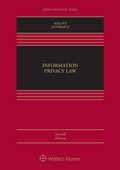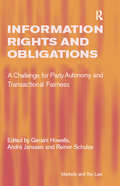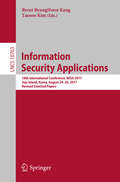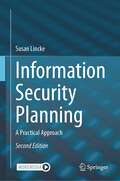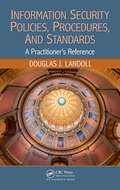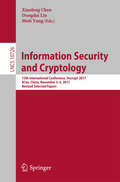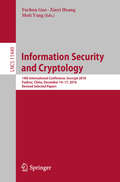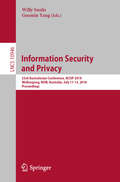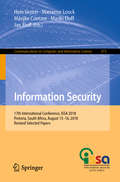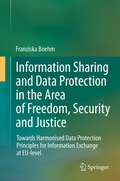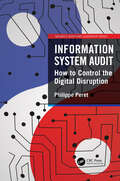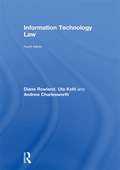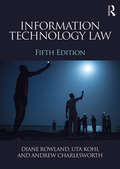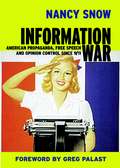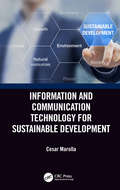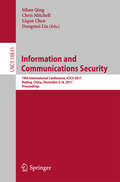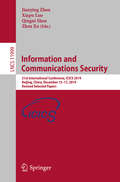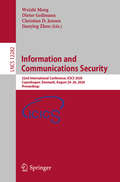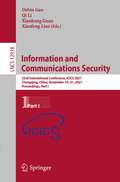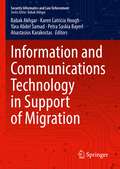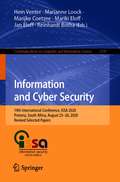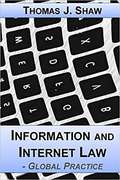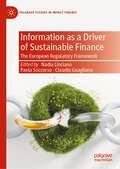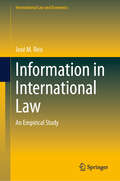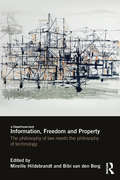- Table View
- List View
Information Privacy Law (Aspen Casebook)
by Daniel J. Solove Paul M. SchwartzThe Seventh Edition of Information Privacy Law has been revised to include the California Consumer Privacy Act, the GDPR, Carpenter, state biometric data laws, and many other new developments. A clear, comprehensive, and cutting-edge introduction to the field of information privacy law, Information Privacy Law contains the latest cases and materials exploring issues of emerging technology and information privacy, and the extensive background information and authorial guidance provide clear and concise introductions to various areas of law.
Information Rights and Obligations: A Challenge for Party Autonomy and Transactional Fairness (Markets and the Law)
by André JanssenInformation requirements have become a key element of consumer policy at the European level and are also gaining increasing importance in all other areas of private law. The law stipulates that information provided should not be misleading and also involves requirements regarding the fairness and objectivity of what has been provided. In addition to controlling the veracity of what is voluntarily offered by traders, the law increasingly requires disclosure of certain information. This volume focuses especially on the question of how these information requirements influence the party autonomy. International contributors explore in various contexts whether the legislative policy regarding the information requirements and their relationship to party autonomy has been properly thought through.
Information Security Applications: 18th International Conference, WISA 2017, Jeju Island, Korea, August 24-26, 2017, Revised Selected Papers (Lecture Notes in Computer Science #10763)
by Brent ByungHoon Kang Taesoo KimThis book constitutes the thoroughly refereed post-conference proceedings of the 18th International Conference on Information Security Applications, WISA 2017, held on Jeju Island, Korea, in August 2017.The 12 revised full papers and 15 short papers presented in this volume were carefully reviewed and selected from 53 submissions. The papers are organized in topical sections such as attack and defense; theory in security; web security and emerging technologies; systems security and authentication; crypto protocols; and attack detections and legal aspects.
Information Security Planning: A Practical Approach
by Susan LinckeThis book demonstrates how information security requires a deep understanding of an organization's assets, threats and processes, combined with the technology that can best protect organizational security. It provides step-by-step guidance on how to analyze business processes from a security perspective, while also introducing security concepts and techniques to develop the requirements and design for security technologies. This interdisciplinary book is intended for business and technology audiences, at student or experienced levels.Organizations must first understand the particular threats that an organization may be prone to, including different types of security attacks, social engineering, and fraud incidents, as well as addressing applicable regulation and security standards. This international edition covers Payment Card Industry Data Security Standard (PCI DSS), American security regulation, and European GDPR. Developing a risk profile helps to estimate the potential costs that an organization may be prone to, including how much should be spent on security controls.Security planning then includes designing information security, as well as network and physical security, incident response and metrics. Business continuity considers how a business may respond to the loss of IT service. Optional areas that may be applicable include data privacy, cloud security, zero trust, secure software requirements and lifecycle, governance, introductory forensics, and ethics.This book targets professionals in business, IT, security, software development or risk. This text enables computer science, information technology, or business students to implement a case study for an industry of their choosing..
Information Security Policies, Procedures, and Standards: A Practitioner's Reference
by Douglas J. LandollInformation Security Policies, Procedures, and Standards: A Practitioner's Reference gives you a blueprint on how to develop effective information security policies and procedures. It uses standards such as NIST 800-53, ISO 27001, and COBIT, and regulations such as HIPAA and PCI DSS as the foundation for the content. Highlighting key terminology, policy development concepts and methods, and suggested document structures, it includes examples, checklists, sample policies and procedures, guidelines, and a synopsis of the applicable standards. The author explains how and why procedures are developed and implemented rather than simply provide information and examples. This is an important distinction because no two organizations are exactly alike; therefore, no two sets of policies and procedures are going to be exactly alike. This approach provides the foundation and understanding you need to write effective policies, procedures, and standards clearly and concisely. Developing policies and procedures may seem to be an overwhelming task. However, by relying on the material presented in this book, adopting the policy development techniques, and examining the examples, the task will not seem so daunting. You can use the discussion material to help sell the concepts, which may be the most difficult aspect of the process. Once you have completed a policy or two, you will have the courage to take on even more tasks. Additionally, the skills you acquire will assist you in other areas of your professional and private life, such as expressing an idea clearly and concisely or creating a project plan.
Information Security and Cryptology: 13th International Conference, Inscrypt 2017, Xi'an, China, November 3–5, 2017, Revised Selected Papers (Lecture Notes in Computer Science #10726)
by Moti Yung Dongdai Lin Xiaofeng ChenThis book constitutes the thoroughly refereed post-conference proceedings of the 13th International Conference on Information Security and Cryptology, Inscrypt 2017, held in Xi'an, China, in November 2017.The 27 revised full papers presented together with 5 keynote speeches were carefully reviewed and selected from 80 submissions. The papers are organized in the following topical sections: cryptographic protocols and algorithms; digital signatures; encryption; cryptanalysis and attack; and applications.
Information Security and Cryptology: 14th International Conference, Inscrypt 2018, Fuzhou, China, December 14-17, 2018, Revised Selected Papers (Lecture Notes in Computer Science #11449)
by Moti Yung Xinyi Huang Fuchun GuoThis book constitutes the post-conference proceedings of the 14th International Conference on Information Security and Cryptology, Inscrypt 2018, held in Fuzhou, China, in December 2018.The 31 full papers presented together with 5 short papers and 1 invited paper were carefully reviewed and selected from 93 submissions. The papers cover topics in the field of blockchain and crypto currency; lattice-based cryptology; symmetric cryptology; applied cryptography; information security; assymetric encryption; and foundations.
Information Security and Privacy: 23rd Australasian Conference, ACISP 2018, Wollongong, NSW, Australia, July 11-13, 2018, Proceedings (Lecture Notes in Computer Science #10946)
by Willy Susilo Guomin YangThis book constitutes the refereed proceedings of the 23rd Australasian Conference on Information Security and Privacy, ACISP 2018, held in Wollongong, Australia, in July 2018. The 41 revised full papers and 10 short papers presented were carefully revised and selected from 136 submissions. The papers present theories, techniques, implementations, applications and practical experiences on a variety of topics such as foundations, symmetric-key cryptography, public-key cryptography, cloud security, post-quantum cryptography, security protocol, system and network security, and blockchain and cryptocurrency.
Information Security: 17th International Conference, ISSA 2018, Pretoria, South Africa, August 15–16, 2018, Revised Selected Papers (Communications in Computer and Information Science #973)
by Jan Eloff Hein Venter Marianne Loock Marijke Coetzee Mariki EloffThis book constitutes the refereed proceedings of the 17th International Conference on Information Security, ISSA 2018, held in Pretoria, South Africa, in August 2018. The 13 revised full papers presented were carefully reviewed and selected from 40 submissions. The papers are dealing with topics such as authentication; access control; digital (cyber) forensics; cyber security; mobile and wireless security; privacy-preserving protocols; authorization; trust frameworks; security requirements; formal security models; malware and its mitigation; intrusion detection systems; social engineering; operating systems security; browser security; denial-of-service attacks; vulnerability management; file system security; firewalls; Web protocol security; digital rights management; distributed systems security.
Information Sharing and Data Protection in the Area of Freedom, Security and Justice
by Franziska BoehmPrivacy and data protection in police work and law enforcement cooperation has always been a challenging issue. Current developments in EU internal security policy, such as increased information sharing (which includes the exchange of personal data between European law enforcement agencies and judicial actors in the area of freedom, security and justice (Europol, Eurojust, Frontex and OLAF)) and the access of EU agencies, in particular Europol and Eurojust, to data stored in European information systems such as the SIS (II), VIS, CIS or Eurodac raise interesting questions regarding the balance between the rights of individuals and security interests. This book deals with the complexity of the relations between these actors and offers for the first time a comprehensive overview of the structures for information exchange in the area of freedom, security and justice and their compliance with data protection rules in this field.
Information System Audit: How to Control the Digital Disruption (Security, Audit and Leadership Series)
by Philippe PeretThe digitalization of companies is a recurrent topic of conversation for managers. Companies are forced to evolve at least as fast as their competitors. They have to review their organization, their processes, and their way of working. This also concerns auditors in terms of their audit strategy and working methods. Digitalization is the tip of the iceberg that represents the increasing reliance on information technology of the company’s information system. Companies have seen new competitors succeed with a digital approach, competitors that have opened new markets or new ways of interacting with their customers, and all business processes can be digitalized. In this new paradigm, auditors have to renew themselves too. Long gone are the days of auditors specializing in one technique, like financial auditors or IT auditors. This makes it a phenomenal opportunity for auditing to renew itself, embracing the vision of the company’s information system: long live the information system auditors! This book proposes you to go step by step from a common understanding of our history of auditing to gradually defining and justifying the impacts of digitalization on the audit strategy and the preparation of audits.
Information Technology Law
by Andrew Charlesworth Diane Rowland Uta KohlThis fourth edition of Information Technology Law has been completely revised in the light of developments within the field since publication of the first edition in 1997. Now dedicated to a more detailed analysis of and commentary on the latest developments within this burgeoning field of law, this new edition is an essential read for all those interested in the interface between law and technology and the effect of new technological developments on the law. New additions to the fourth edition include: analysis of regulatory issues and jurisdictional questions specific consideration of intermediary liability developments in privacy and data protection extension of computer crime laws developments in software patents open source software and the legal implications.
Information Technology Law
by Andrew Charlesworth Diane Rowland Uta KohlThe fifth edition of Information Technology Law continues to be dedicated to a detailed analysis of and commentary on the latest developments within this burgeoning field of law. It provides an essential read for all those interested in the interface between law and technology and the effect of new technological developments on the law. The contents have been restructured and the reordering of the chapters provides a coherent flow to the subject matter. Criminal law issues are now dealt with in two separate chapters to enable a more focused approach to content crime. The new edition contains both a significant amount of incremental change as well as substantial new material and, where possible, case studies have been used to illustrate significant issues. In particular, new additions include: * Social media and the criminal law; * The impact of the decision in Google Spain and the 'right to be forgotten'; * The Schrems case and the demise of the Safe Harbour agreement; * The judicial reassessment of the proportionality of ICT surveillance powers within the UK and EU post the Madrid bombings; * The expansion of the ICANN gTLDs and the redesigned domain name registration and dispute resolution processes.
Information War: American Propaganda, Free Speech and Opinion Control Since 9-11 (Open Media Series)
by Greg Palast Nancy SnowIn Information War, former United States Information Agency employee Nancy Snow describes how U.S. propaganda efforts and covert operations are expanding more rapidly today than at any other time in U.S. history, as the Bush administration attempts to increase U.S. dominance by curbing dissent and controlling opinion. Snow lays out the propaganda techniques that the government uses to control dissent in the twenty-first century, spotlights the key players and their spinmeistering abilities in the information war, and describes memorable "leaks" in the Administration's efforts to conduct stealth propaganda programs and control information at home. Ultimately she shows that dissent and true democracy are the early casualties of these policies.
Information and Communication Technology for Sustainable Development
by Cesar MarollaInformation and Communication Technology for Sustainable Development shows how ICT, as an enabler for all spheres of development, can help innovate business processes and operations, and provide faster integration of new technologies into business systems. Focused on sustainability, the book addresses strategic approaches to cope with a range of climatic, environmental, cyber-security threats and other global risks, and aims to promote prosperity and economic growth. Furthermore, it explores how the adoption of new technologies, and collective action based upon a strategic behavioral theory of new leadership, can be applied when responding to specific set of conditions that allow for the proposed strategies to cope with risks. Information technology and strategic planning complement each other to attain the sustainable development goals (SDGs). Risk management frameworks, business continuity systems, and strategic planning methodologies such as mechanism design theory, strategic adaptive cognition (SAC), and risk mechanism theory (RMT) are the fundamental components needed to have a universal approach embedded into the national development plans agenda. As technology no longer follows an orderly, linear path, but improves exponentially, developing a strategic approach to ICT implementation help world leaders in the difficult but inspiring task of making a sustainable world and consequently find solutions to achieve the SDGs and the desired growth pattern that must be sustained, inclusive and equitable. Features: Discusses for the first time the potential of ICT as a transformative power in finding solutions to climatic and economic issues. Illustrates comprehensive strategic planning for leaders to implement in both public and private organizations. Integrates standards and frameworks in the context of sustainable development along with the UN Sustainable Development Goals. Describes in detail how mechanism design, risk management, business continuity systems, a comprehensive strategic planning using SAC (Strategic Adaptive Cognition) and risk mechanism theory can be used to address environmental risks and attain sustainable development goals (SDGs). Explains eHealth as an adaptation strategy to address future changes in climate and impacts, and the links between mitigation and adaptation to ICTs.
Information and Communications Security: 17th International Conference, Icics 2015, Beijing, China, December 9-11, 2015, Revised Selected Papers (Lecture Notes In Computer Science #9543)
by Chris Mitchell Liqun Chen Sihan Qing Dongmei LiuThis book constitutes the refereed proceedings of the 19th International Conference on Information and Communications Security, ICICS 2017, held in Beijing, China, in December 2017. The 43 revised full papers and 14 short papers presented were carefully selected from 188 submissions. The papers cover topics such as Formal Analysis and Randomness Test; Signature Scheme and Key Management; Algorithms; Applied Cryptography; Attacks and Attacks Defense; Wireless Sensor Network Security; Security Applications; Malicious Code Defense and Mobile Security; IoT Security; Healthcare and Industrial Control System Security; Privacy Protection; Engineering Issues of Crypto; Cloud and E-commerce Security; Security Protocols; Network Security.
Information and Communications Security: 21st International Conference, ICICS 2019, Beijing, China, December 15–17, 2019, Revised Selected Papers (Lecture Notes in Computer Science #11999)
by Jianying Zhou Xiapu Luo Qingni Shen Zhen XuThis book constitutes the refereed proceedings of the 21th International Conference on Information and Communications Security, ICICS 2019, held in Beijing, China, in December 2019. The 47 revised full papers were carefully selected from 199 submissions. The papers are organized in topics on malware analysis and detection, IoT and CPS security enterprise network security, software security, system security, authentication, applied cryptograph internet security, machine learning security, machine learning privacy, Web security, steganography and steganalysis.
Information and Communications Security: 22nd International Conference, ICICS 2020, Copenhagen, Denmark, August 24–26, 2020, Proceedings (Lecture Notes in Computer Science #12282)
by Jianying Zhou Dieter Gollmann Weizhi Meng Christian D. JensenThis book constitutes the refereed proceedings of the 22nd International Conference on Information and Communications Security, ICICS 2020, held in Copenhagen, Denmark*, in August 2020. The 33 revised full papers were carefully selected from 139 submissions. The papers focus in topics about computer and communication security, and are organized in topics of security and cryptography.*The conference was held virtually due to the COVID-19 pandemic.
Information and Communications Security: 23rd International Conference, ICICS 2021, Chongqing, China, November 19-21, 2021, Proceedings, Part I (Lecture Notes in Computer Science #12918)
by Qi Li Xiaofeng Liao Debin Gao Xiaohong GuanThis two-volume set LNCS 12918 - 12919 constitutes the refereed proceedings of the 23nd International Conference on Information and Communications Security, ICICS 2021, held in Chongqing, China, in September 2021. The 49 revised full papers presented in the book were carefully selected from 182 submissions. The papers in Part I are organized in the following thematic blocks: blockchain and federated learning; malware analysis and detection; IoT security; software security; Internet security; data-driven cybersecurity.
Information and Communications Technology in Support of Migration (Security Informatics and Law Enforcement)
by Babak Akhgar Petra Saskia Bayerl Karen Latricia Hough Yara Abdel Samad Anastasios KarakostasThe book provides a holistic review, presenting a multi-stakeholder, multi-disciplinary, international, and evidence-based approach to Information and Communications Technology (ICT) in migration. The book brings together different views and multifaceted responses to ICT-based migration management, examining their overlap, conflict, and synergies. The book is a major addition to the field, tackling important debates concerning humanitarianism and securitization in the reception of migrants, as well as exploring the role of digital technology in aiding migrant integration. The authors explore contentious areas such as the use of new technologies deployed on borders for migration management and border security under the umbrella of smart border solutions including drones, AI algorithms, and face recognition, which are widely criticized for ignoring the fundamental human rights of migrants. The research presented will depart from the euphoric appraisals that technology has made things easier for migrants and those who assist them, to critically examine the bane and boon, benefits and afflictions, highlighting the barriers, as well as the solutions, including several under-researched aspects of digital surveillance and the digital divide.This edited volume has been developed by the MIICT project, funded under the EU Horizon 2020 Action and Innovation programme, under grant agreement No 822380. Provides a positive approach to the integration of migrants, asylum seekers, and refugees using Information and Communications Technology (ICT) solutions Offers a strategic approach to providing digital services for migrants at an EU, national and local level Bridges the gap between academia and front-line practitioners’ work by providing theoretical, policy, ethical, and methodological recommendations
Information and Cyber Security: 19th International Conference, ISSA 2020, Pretoria, South Africa, August 25–26, 2020, Revised Selected Papers (Communications in Computer and Information Science #1339)
by Jan Eloff Hein Venter Marianne Loock Marijke Coetzee Mariki Eloff Reinhardt BothaThis book constitutes the refereed post-conference proceedings of the 19th International Conference on Information Security, ISSA 2020, which was supposed to be held in Pretoria, South Africa, in August 2020, but it was held virtually due to the COVID-19 pandemic.The 10 revised full papers presented were carefully reviewed and selected from 33 submissions. The papers deal with topics such as authentication; access control; digital (cyber) forensics; cyber security; mobile and wireless security; privacy-preserving protocols; authorization; trust frameworks; security requirements; formal security models; malware and its mitigation; intrusion detection systems; social engineering; operating systems security; browser security; denial-of-service attacks; vulnerability management; file system security; firewalls; Web protocol security; digital rights management; and distributed systems security.
Information and Internet Law: Global Practice
by Thomas ShawThe worlds of today and tomorrow rely upon open networks connecting far-flung participants exchanging information both personal and commercial. Bringing some certainty to this very dynamic environment are the legal foundations supporting the free flow of information over the Internet. <p><p> New lawyers, lawyers new to information and Internet law, lawyers updating their knowledge on the latest statutes and cases, and lawyers desiring a global comparative legal perspective are among the audiences who require this single resource to consolidate their understanding of global information and Internet law. This book, up-to-date to March 2018, provides insight by looking at current statutes, regulations, and directives in the United States and Europe, supplemented by statutes in Asia and the Americas ex-U.S. It discusses and identifies issues raised by the latest U.S. and EU cases on protection of information and use of the Internet. <p><p> It starts with a risk-based, lifecycle approach to this area of law. The areas of information law addressed: privacy, information security, and data protection law, unlawful data disclosures through cybercrime and data breach, and lawful data disclosures related to messaging and surveillance. The areas of Internet law addressed: access, jurisdiction, speech, intermediary liability, intellectual property, and e-commerce through electronic and website agreements. Bringing a unique perspective to explain a complex topic, the author has written numerous books on legal technology and legal history, writes and speaks extensively on the latest developments in technology law, teaches U.S.-EU comparative law school courses on information, Internet, and emerging technologies law, and had worked in complementary disciplines across the major parts of the world. This book is the result of those many years of experience and insight.
Information as a Driver of Sustainable Finance: The European Regulatory Framework (Palgrave Studies in Impact Finance)
by Nadia Linciano Paola Soccorso Claudia GuaglianoThe Sustainable Development Goals introduced by the United Nations in 2016 call for the significant mobilisation of finance. However, although sustainable investments are steadily increasing, there still remain large gaps within financing and the information that financial markets rely on is often incomplete or incorrect. For instance, the financial system has been structured around short-term frameworks and goals while the most pressing environmental and social challenges are long-term. Prices do not convey the cost of externalities associated with social and environmental challenges. It is therefore important to implement the effective pricing of externalities and create a common language and taxonomy between investors, issuers and policy-makers in order to best serve sustainable development. Addressing this challenge, the authors delve deeper into the levers that can be pulled within the financial system to prompt an efficient ecosystem of sustainability-related information, allowing social and environmental externalities to be incorporated into the decision-making process of all market agents. Incentives needed for investors, issuers and intermediaries are proposed along with regulation that can trigger these incentives. This book offers a comprehensive collection of chapters which explore the ongoing evolution of the European regulatory framework, providing essential reading for policymakers, practitioners and researchers alike.
Information in International Law: An Empirical Study (International Law and Economics)
by José M. ReisExamining state behavior, this book sheds light on the often-overlooked role of information production and diffusion in international law and relations. Most theories of public international law and state behavior rely on a certain degree of international law-related information, such as an international legal ruling, being made public and diffused to reach various key actors such as third states or domestic actors. However, while assumptions about information being produced and diffused permeate international legal scholarly work, these assumptions have not been systematically and empirically evaluated. Based on an empirical analysis, the author challenges prevailing assumptions by systematically evaluating the accessibility and dissemination of crucial international law related information such as treaty negotiation documents or legal rulings. Using a variety of quantitative case studies on key stages of international lawmaking and covering various issue-areas, from human rights to trade law, each chapter traverses three critical levels of analysis, namely whether international law information is public and transparent, whether the information is salient and reaches the general public, and how the information is framed by the media and political elites. The book will appeal to students, researchers, and scholars of law, political science, and economics, as well as policy-makers interested in a better understanding of information production and diffusion in international law and the impact of public opinion on compliance with international law.
Information, Freedom and Property: The Philosophy of Law Meets the Philosophy of Technology
by Mireille Hildebrandt Bibi van den BergThis book addresses issues on the nexus of freedom of and property in information, while acknowledging that both hiding and exposing information may affect our privacy. It inquires into the physics, the technologies, the business models, the governmental strategies and last but not least the legal frameworks concerning access, organisation and control of information. It debates whether it is in the very nature of information to be either free or monopolized, or both. Analysing upcoming power structures, new types of colonization and attempts to replace legal norms with techno-nudging, this book also presents the idea of an infra-ethics capable of pre-empting our pre-emption. It discusses the interrelations between open access, the hacker ethos, the personal data economy, and freedom of information, highlighting the ephemeral but pivotal role played by information in a data-driven society. This book is a must-read for those working on the contemporary dimensions of freedom of information, data protection, and intellectual property rights.
